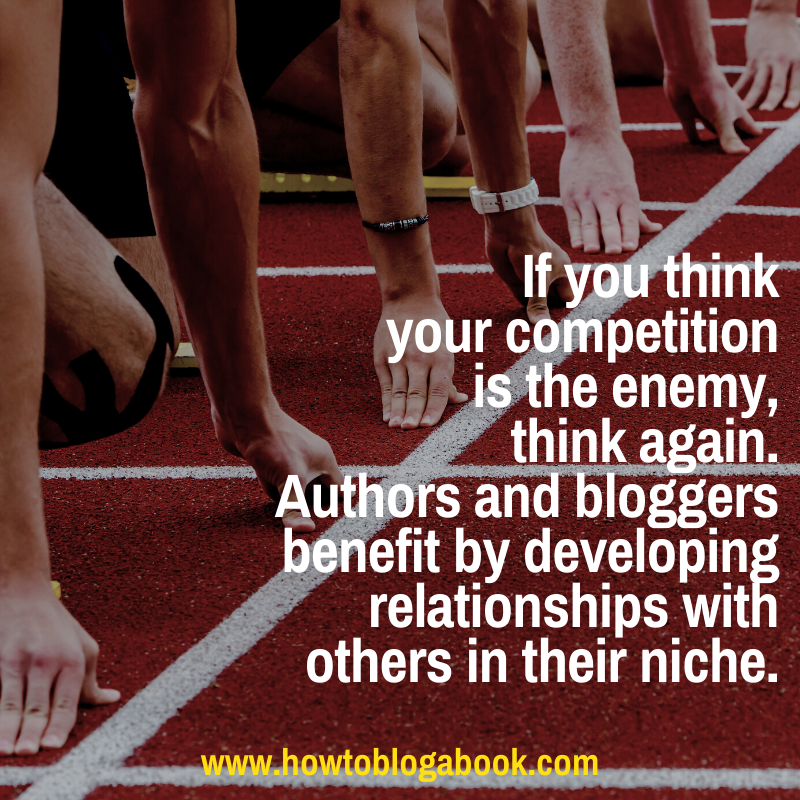Before I became an author, I thought authorship would be a lonely endeavor. I figured I would have to go it alone—just me and my book in search of an audience. But it didn’t take me long to realize it doesn’t have to be like that. In fact, that mindset is incorrect and limits your potential to succeed as an author.
There’s a tendency to think you can’t collaborate with anyone else within your niche. The theory is that these other authors are competition and, therefore, a threat. Not only that, they will steal your readers. This couldn’t be further from the truth.
When I wrote my first book, some of the most fulfilling connections I made were with other authors within books on similar topics. And the so-called “competition” turned out to be the most helpful in supporting my growth and the success of my book.
I muddled through this process—learning on the fly, but hindsight is a wonderful thing. So, looking back, here’s what I would have done differently when it comes to building an audience and connecting with the competition.
Step 1: Identify Your Competition
Before you launch your blog or write the first page of your book, conduct competitive research. There’s no point in writing about a topic that has been covered extensively already unless you have something different to say. It’s common for first-time authors to make their book’s topic too broad, but competitive research can help you narrow your niche and pinpoint your target audience.
This research into other blogs and authors within your area of interest has a dual benefit. It allows you to pinpoint the topics you want to write about, but it also helps you identify bloggers and authors with overlapping content. Your priority should be to connect with others that have an online presence—whether they’ve published a book or not.
Some of the key information to capture when doing competitive research is:
- Name and email
- Website name and URL
- Social media links
- Core topics they write about (evident from their blog menu or categories)
- Books they’ve published
You can also capture your personal thoughts and perspectives about the blogger, blog, and content, as well as how relevant and beneficial a connection with these influencers would be. And although it may be too early in the process to start collaborating with them, this data will give you a sense of the size of the niche you’re targeting.
Don’t make the mistake of reaching out to collaborate before you’ve launched your website and started blogging. Make sure that your activities are contributing to an overall marketing strategy. So rather than rushing in, a mindful and well-thought-out approach makes the best use of your time—and theirs.
Step 2: Connect with Your Competition
Even bloggers at the beginning of their writing journey can participate in activities that lay the groundwork for increased collaboration down the line. Here are a few options that take little effort to establish a connection:
- Blog Commenting: Subscribe to a blog’s RSS feed to track when a new post has been published. This is a great way of identifying prolific vs. casual bloggers within your niche. Comment on blog articles when you have a point of view, personal insight to contribute, or have a question. If there’s an option of leaving a URL, leave a link to your home page or to a specific blog post relevant to the article you’re commenting on.
- Share Blog Posts: When you share other bloggers’ posts on your social media feeds, it shows your followers you have your finger on the pulse of relevant content. The type of article you share also helps convey your point of view and perspective on specific topics, even if you haven’t written about them. It can be a challenge coming up with a constant stream of interesting and valuable social media content, so when you find bloggers who create quality content tap into that source.
- Social Media Interaction: Any competition with a broad social presence is a benefit not a threat to your success. Your interaction helps boost their engagement but also bolsters your own social footprint. That blogger’s audience will begin to connect to the contributions you’re making and view you as somebody worth following. It’s much better to create a regular chain of liking, commenting, and sharing on one network than intermittent and irregular interaction across multiple networks, though. Therefore, follow and interact with these bloggers on the social network you enjoy using the most.
- Join Mailing Lists: Subscribe to their mailing lists to discover what these bloggers are sharing with their audiences. This is a great way of seeing how you can adopt communication techniques that feel natural to your style. If they ask a question in their email, take the time to respond. This often gets a personal response and is a natural way to establish an email exchange and relationship.
- Subscribe to Podcasts or Video Channels: Many bloggers have ventured into audio or video content creation. You can subscribe to their feed and leave a review of their show or comment on episodes. This is another way to form a relationship.
All these suggestions are simple ways to establish a connection with your competitors. And your efforts could end up being the start of a beneficial collaboration opportunity. Set yourself a daily or weekly time limit to focus on interactive activities. Or choose a weekly target for the number of interactions you can comfortably commit to and maintain.
These activities are primarily aimed at giving. You’re boosting their social media popularity, providing feedback, and offering additional insights and input that could benefit the other blogger’s audience. But you’ll also start to reap some benefits from sharing their content with your followers.
Step 3: Leverage Your Competition
Once you’ve consistently interacted with competitors within your niche, you’ll have a good feel for people with whom you want to strengthen a connection. It’s best to opt for quality rather than quantity, e.g., find a handful of bloggers to build a long-term and meaningful relationship.
This step is where you start a more balanced connection of give and take. (Never forget about the giving element!) It’s an opportunity to provide value to your competition but also receive some benefits yourself. Here are a few suggestions to get you started:
- Guest Blogging: Don’t make the mistake of guest blogging too early in your writing journey. It’s an opportunity to get your name in front of another audience, but if you haven’t established a good online presence and put some thought into what you want this action to achieve, it’s a wasted opportunity. Host blogs usually allow at least one link back to your website or a blog post, so ensure this leads readers to follow your specific call to action.
- Host a Guest Blogger: Not all bloggers write guest articles, but some are happy to contribute to blogs that have a consistent history of posts, strong traffic, and a decent social presence. Do an online search to see if your competitors have a history of blog contributions, and use this information to suggest ideas for a blog topic. This removes the stress around them coming up with an idea but also ensures the topic is relevant to your audience. Bloggers with an upcoming book or product are most likely to be open to a guest blogging opportunity. So, keep an eye out for activities that could benefit from some additional promotional support, and offer your blog as a platform.
- Contribute to Your Book: Whether you’re looking for somebody within your niche to write an introduction to your book or supply content or quotes, people are usually flattered to be asked for a contribution. If there is synergy between their book and yours, you offer to swap recommendations. You can even both agree to include a page at the back of your book that features their book and vice versa.
Taking the time early in your blogging and writing journey to make these connections can really pay dividends in the long term—especially if you have turned connections into relationships.
Marketing and promoting your blog and book take continued and ongoing effort. Why struggle to do it alone, when there are others within your niche in the same situation as you. They want to get the word out about their content and want to grow their audience.
Time to partner up. Doing so will not only benefit you, and it’s much more enjoyable to collaborate with others within your niche.
What type of blog posts do you write when you’re not in the mood to blog your book? Share your ideas and suggestions in the comments below.
About the Author

Jay Artale abandoned her corporate career to become a digital nomad and full-time writer. She’s an avid blogger and a nonfiction author helping travel writers and travel bloggers achieve their self-publishing goals. Join her at Birds of a Feather Press where she shares tips, advice, and inspiration to writers with an independent spirit.
Photo courtesy of msgrafixx.


Leave a Reply